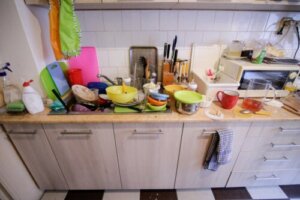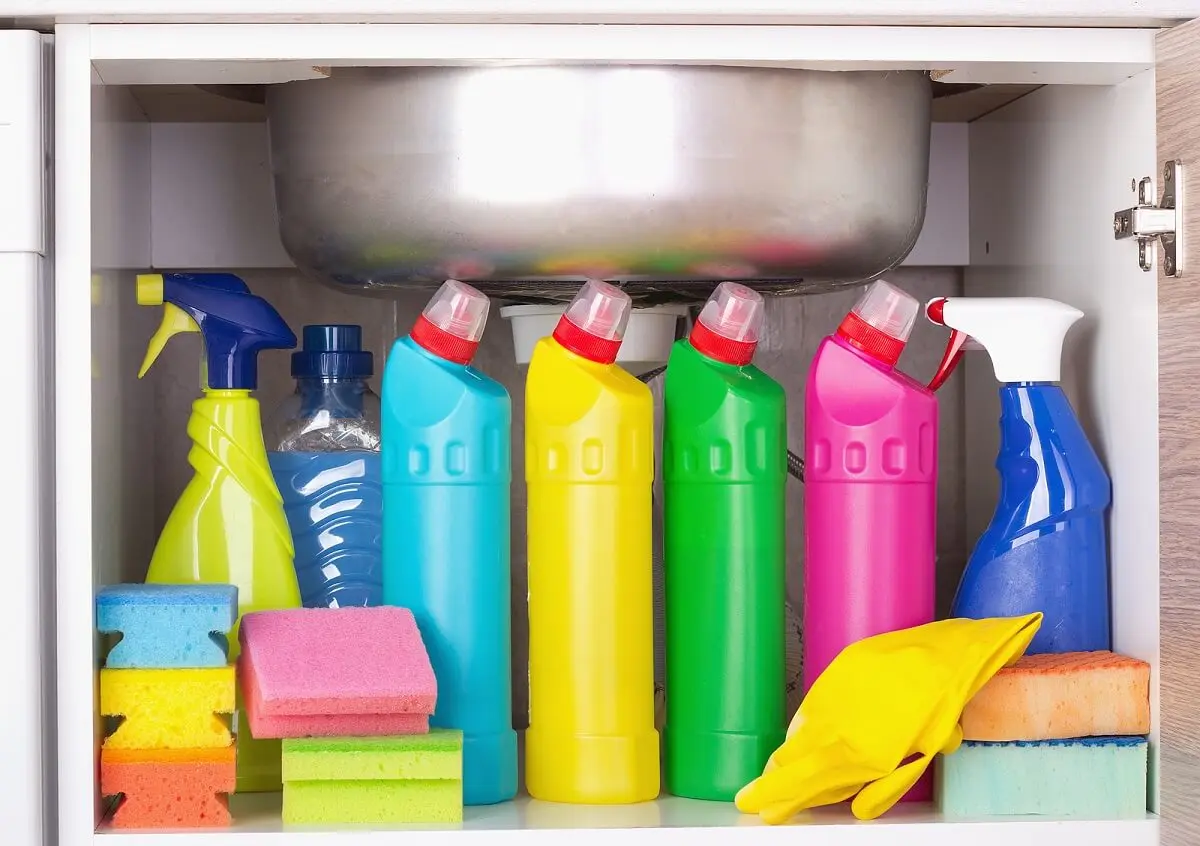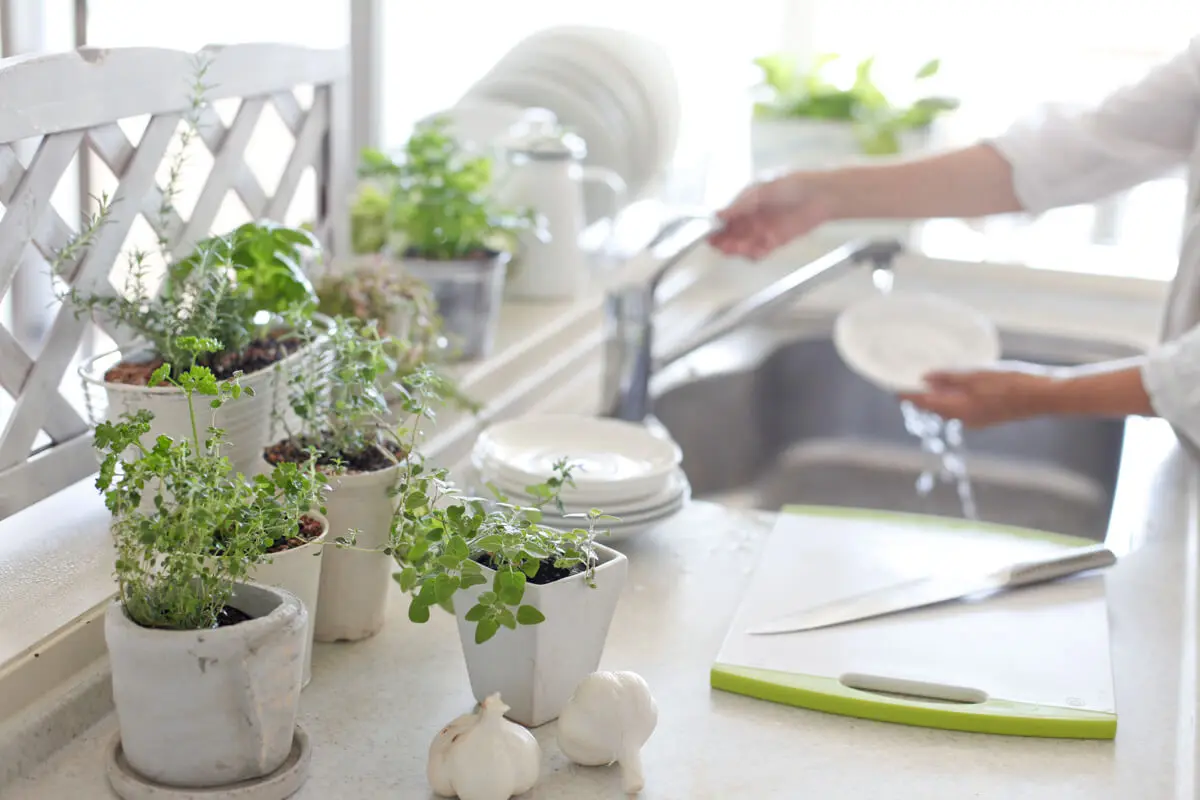7 Things that Shouldn't be in Your Kitchen

In this article, we’ll talk about the things that shouldn’t be in your kitchen. The kitchen is one of the places in the house that we use the most and where most things are stored.
For this reason, it’s advisable to keep it organized and with the right things you need to prepare meals. In addition to allowing you to stay organized, keeping your kitchen properly organized also helps to store things correctly and to prevent contamination of food and diseases.
To have a healthy and safe kitchen, it’s essential to know tips on how to make good use of products and tools. It doesn’t matter if you have a small, medium, or large kitchen; for safety, cleanliness, and practicality, here are some suggestions of things you should not store in it.
We think you may be interested in reading this, too: 6 Common Mistakes to Avoid when Decorating the Kitchen
1. Toxic and cleaning products
Cleaning products, such as those that include bleach, soaps, and fabric softeners, alcohol, degreasers, or plant fertilizers, should not be stored in the kitchen, much less in the same drawer or cabinet as food. On the one hand, in the case of an accident, they could be ingested or could contaminate your food.
On the other hand, some of them are often flammable products. Storing them in an area where there’s fire is dangerous.
The recommendation is to have only dish soaps, scrubbing sponges, and some cleaning cloths for the stove and countertops. If for some reason you decide to keep cleaning products, make sure they’re in a separate drawer from food.

2. Medications
Medications should not be stored in the kitchen for several reasons. First, they can be damaged if stored near the oven, stove, or other heat source.
In fact, their instructions often recommend storing them in a cool place. In addition, this also prevents them from being accidentally consumed or mixed with food, especially when children are nearby.
3. Used containers and packaging
On several occasions, when shopping or ordering food at home, it’s possible to save the containers in which the food comes. However, this often results in a lot of containers that are never used. It’s best not to even be tempted to accumulate the..
Glass, plastic, and cardboard that you haven’t used for years should be disposed of. If you take them to a recycling facility, you will not accumulate unnecessary objects that take up too much space in the kitchen.
Like this article? You may also like to read: How to Organize Your Kitchen According to Marie Kondo
4. Expired food
We recommend that you frequently check the cupboard to avoid having expired products that could cause food poisoning. Also, if you buy products in bulk or repackage spices and other groceries in glass jars, write down the expiration date somewhere.
On the other hand, it’s also advisable to check the refrigerator frequently to verify that meats, dairy products, fruits, and vegetables are not spoiled. In this regard, the U. S. Food and Drug Administration (FDA) states that any food that looks or smells suspicious should be thrown away.
Also, the FDA points out that many pathogens can be found in raw or undercooked meat, seafood and dairy products, so they need to be refrigerated properly.
Always read the label before eating food. Of the things that should not be in your kitchen, expired products are one of the most common. This often happens because of carelessness.
5. Utensils in bad condition
In all kitchens, it is required to have sharps (knives, scissors, tweezers, and forks) for handling and cutting meat, fish and other foods. It’s important to check the condition and sharpness of these utensils. If you notice that they’re deteriorating, it’s best to replace them.
Glasses, pots, aprons, and everything that you notice is broken, burned, stained, or worn out is better to get rid of. This prevents accumulation and accidents. It’s a good idea to check the materials of kitchen utensils as well, as there are many that release toxins that are associated with diseases, such as PFA or BPA.
6. Plants and decorations
Fashion and commerce offer us a variety of unnecessary decorations. Although it’s possible to have a beautiful and decorated kitchen, an excess can be counterproductive. It’s advisable to check to evaluate if we really need everything that we have.
It’s a good idea to look for adequate spaces to store appliances and all the kitchenware. In this way, it will also contribute to have a kitchen with a good aesthetic.
As for the plants, before acquiring them, it’s better to reflect if they will really be useful and will have some benefit for our kitchens. We need a lot of free space for handling and cooking food.

7. Pets
As for pets, it’s better to train them and get them used to not being in the kitchen. First of all, this is crucial to avoid the presence of hair that could contaminate food.
Also, make sure that the space is free to move around and use the utensils. As for cats, you have to prevent them from climbing on furniture and countertops because of the risk of transmitting toxoplasmosis.
Be careful with your children
Now that you know the things that should not be in your kitchen, you should know that when you have babies and children at home, it’s also advisable to adapt the space so that your little ones are not exposed to danger. In this sense, the most advisable thing to do is to remove all sharp objects from the lowest drawers.
It’s also a good idea to keep electrical appliances that heat up or can hurt them away from their reach. However, it’s also important to accompany the removal with an explanation of why you should be careful. Children are naturally curious. It’s always better to be safe than sorry.
However, it’s not entirely advisable to ban them from the kitchen. You can share the space and even give them chores. They can even have a drawer assigned to them where they can find healthy snacks if they’re hungry.
All cited sources were thoroughly reviewed by our team to ensure their quality, reliability, currency, and validity. The bibliography of this article was considered reliable and of academic or scientific accuracy.
- Are there “Forever Chemicals” in Your Kitchen Counter? (s/f). Green Science Policy Institute. Recuperado el 18 de mayo de 2022, de https://greensciencepolicy.org/news-events/blog/are-there-forever-chemicals-in-your-kitchen-counter
- Center for Food Safety, & Applied Nutrition. (2021, septiembre 3). ¿Está almacenando los alimentos en forma segura? U.S. Food and Drug Administration. https://www.fda.gov/consumers/articulos-en-espanol/esta-almacenando-los-alimentos-en-forma-segura
This text is provided for informational purposes only and does not replace consultation with a professional. If in doubt, consult your specialist.








